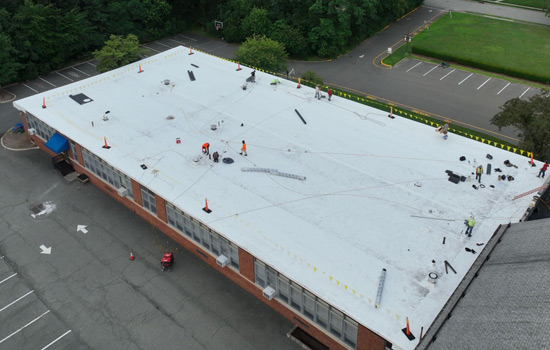Sometimes people ask us what commercial roofing is? Aren’t all roofs the same, they wonder? Don’t houses have roofs just like factories, office buildings, and stores? In reality residential roofing is quite different from commercial roofing. If you’re a business owner or property manager, you probably know that commercial roofs require a specific approach and expertise that’s different from the residential side of roofing. By understanding these differences and what goes into a well constructed and maintained commercial roof, you’ll enjoy the peace of mind that comes from having a safe and secure roof.
What is a Commercial Roof?
First, let’s define what a commercial roof is. A commercial roof is specifically designed and constructed to cover commercial buildings. These commercial buildings can be everything from office buildings and warehouses to retail stores and industrial facilities. A commercial roof typically needs to be much larger than those of home roofs and is more complex because it needs to support additional elements like HVAC systems, signage, solar panels, drainage systems, and safety equipment.
This is why commercial roofing systems will generally use different materials and construction/maintenance strategies than typical home roofers. This commercial approach ensures durability, energy efficiency, and safety. MK Roofing for instance specializes in commercial roofings and are experts in supplying North Jersey businesses and property managers with the know-how and experience to provide a long-lasting and reliable commercial roof.
Types of Commercial Roofing Systems
When installing a new roof or replacing an aging commercial roof, many factors come into play when deciding on its construction and what materials will be used. Some of the factors you’ll want to consider are the need for energy efficiency, your budget, the aesthetics or visibility of the roof, and whether it will need to withstand exposure to sun, wind, chemicals or grease. In addition, you should factor in how much foot traffic your roof will receive and how long you’d like it to last.
The majority of commercial roofs are flat roofs and here there are a number of materials which can be used to cover and coat them for protection and durability. But not all commercial roofs are flat. For instance, some large storefronts or apartment and condo buildings feature low-slope roofs, which are defined as a slope of less than three inches per foot. Steep slope roofs have more than three inches of slope but are more rare in commercial buildings.
Maintaining and Improving An Existing Commercial Roof
Many commercial roofs, particularly those for large footprints are built of metal, such as corrugated galvanized steel. But there are a variety of other types of roofs, from asphalt to rubber and spray foam. These can all be coated to extend their life and enhance their durability. Older types of built-up roofing, which is the old tar and gravel style can be coated, but they will require a scraping and coating of primer before the new coating can be applied. Two types of roofs which cannot have a coating added to them are asphalt shingles and tile roofing.
Maintaining a commercial roof is essential to the health of your business. Not only can a failing roof cause you to lose revenue through increased energy costs and potential damage to your assets inside your building, but it can also pose a threat to the health of those in your building due to mold growth from water damage. Furthermore, leaks can delay work, present a poor image to customers, and clients, and impact the structure of your facility.
Luckily maintenance can be a straightforward process thanks to protective covering options such as Thermoplastic Polyolefin (TPO) and synthetic rubber-based Thermoset, along with acrylic, silicone, or polyurethane coatings. Each of these types of additional layers can add years to the life of your roof, so it’s best to consider your specific needs in order to choose the one that is right for your location. MK Roofing is well versed in each of these options and can help you compare benefits so you can make the right decision for extending the lifespan of your roof.
Special Considerations of Commercial Roofs
When repairs are required for a commercial roof, often there is a more involved insurance process than homeowners typically need to deal with. This can be a daunting process that many business owners and property managers are not equipped to handle alone. That’s where the advice and guidance of an experienced commercial roofer is beneficial. MK Roofing for example has experience with insurance claims assistance and can help you cut through the red tape to give you better odds of getting your claim approved and in a timely manner.
Choosing a Commercial Roofer Who Understands Your Needs
As you can see, commercial roofs are vastly different from residential roofs and require a roofing company that is experienced and dedicated to serving the needs of commercial facilities. MK Roofing has decades of experience serving businesses in North Jersey. With a local team based in Hampton, NJ, MK Roofing is committed to educating customers about their commercial roof options and providing repairs for a variety of roofs including shingled, TPO, metal, EPDM, PVC, and more. Whether you need a new roof or just need repairs made to your existing commercial roof, MK Roofing is ready to guide you through every step of the process, from consultation and inspection to installation and cleanup. Ready to secure your business space from the top down? Protect your assets now and into the future with the best commercial roof for your needs. Start with a simple consultation. If your business is located in North Jersey, MK Roofing is happy to provide a full consultation and roof evaluation so you know exactly the best roofing route to take.

